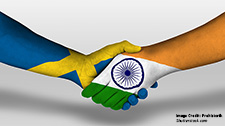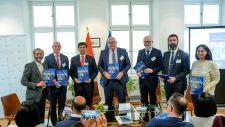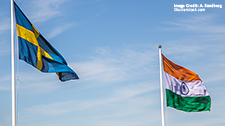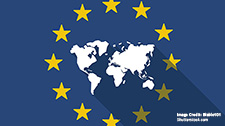ISDP-Embassy of India in Sweden Dialogue Calls for Focusing Momentum in India-Sweden Ties
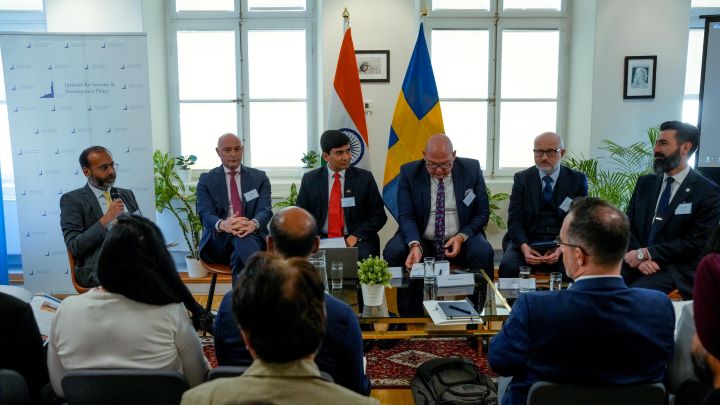
Jagannath Panda, Niklas Swanström, Mahima Duggal, Mariya Krupach, Giulia Saccone and Toby Logan
- Focus on six key areas: Science & Technology, Innovation, Energy, Sustainable Development, Defense, and Trade Economics.
- The partnership between India and Sweden can be replicated as a model for the rest of the Nordic community.
- Cultural and educational linkages between India and Sweden and India and the Nordic countries must be advanced.
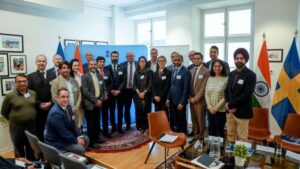
April 2, 2025: Key policy makers and strategic analysts from India and Sweden called for focusing the high-level engagement between the two countries to take it to the next level.
They were speaking at a one-day strategic dialogue to evaluate and prepare context for policy to strengthen India-Sweden ties as well as India-Nordic ties organized by the Stockholm Center for South Asian and Indo-Pacific Affairs (SCSA-IPA) at the Institute for Security and Development Policy (ISDP), Sweden, in collaboration with the Embassy of India in Sweden. Dr. Jagannath Panda, Head of the Stockholm Center for South Asian and Indo-Pacific Affairs, planned and curated this timely dialogue in collaboration with the Embassy of India in Sweden.

The dialogue held in Stockholm discussed key areas of bilateral cooperation, stressing how a strong and enduring India-Sweden bilateral partnership can pave the way for greater India-Nordic engagement and complement a broader India-Nordic and India-EU relationship. The six critical areas identified and discussed were Science & Technology, Innovation, Energy, Sustainable Development, Defense, and Trade Economics.
Titled “India-Sweden Ties as a Gateway to India-Nordic Engagement: A Six-fold Approach to Cooperation”, the intent behind this collaborative dialogue was to develop actionable recommendations to foster a robust framework for long-term collaboration between India and the Nordic countries. On the occasion, ISDP released a Special Publication: “India-Sweden Ties as a Gateway to India-Nordic Engagement,” edited by Jagannath Panda, Niklas Swanström, and Mahima Duggal.
At the event, the keynote speech was delivered by Mr. Robin Sukhia, Secretary General and President, Sweden-India Business Council. Special remarks were made by Mr Tanmaya Lal, Secretary (West), Ministry of External Affairs, Government of India, and Swedish Members of Parliament Dr. Stefan Olsson (M) and Mr. Rashid Farivar (SD). The event was inaugurated by Mr. Rakesh Kumar Tiwari, Charge D’ Affairs, Embassy of India in Sweden, and Dr. Niklas Swanström, Executive Director, ISDP, Sweden. Dr. Jagannath Panda, Head of the Stockholm Center for South Asian and Indo-Pacific Affairs, welcomed the participants and strongly advocated that India needs to be better understood in Sweden, the Nordic, and broader European platforms.
Speakers noted the momentum building from high-level engagement between India and Sweden, with particular thanks to members of Sweden’s parliament who have taken part in numerous visits to India. Moreover, with over 280 Swedish companies operating in India, trade and engagement linkages offer mutually beneficial exchange for the two parties. Ongoing visits and discussions, especially those in technology and sustainability, further solidify India’s engagement in the Nordic region.
A diverse range of stakeholders, particularly policy practitioners, academicians, and industry partners, gathered and discussed the following critical areas of cooperation and the mechanisms to do so.
- Science & Technology: Collaborative research initiatives, joint technological developments, and innovation hubs.
- Innovation: Sharing best practices, promoting startup ecosystems, and fostering entrepreneurial collaborations.
- Energy: Joint ventures in renewable energy projects, energy efficiency technologies, and sustainable energy policies.
- Sustainable Development: Initiatives aimed at achieving sustainable development goals, climate action, and environmental conservation.
- Defense: Enhancing defense cooperation through joint exercises, defense technology transfers, and strategic dialogues.
- Trade Economics: Strengthening economic ties through trade agreements, investment opportunities, and economic policy alignment.
In addition to the above areas, cultural linkages and educational linkages were also stressed as areas of cooperation between India and Sweden and India and the Nordics.
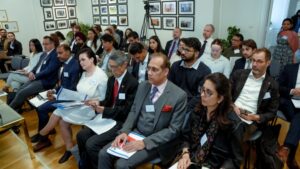
This dialogue came as a timely discussion amid multiple global challenges. As two democratic nations that respect the rule of law, there is a natural and established growing partnership. India and the Nordic region are the fifth and tenth largest economies, respectively, and Sweden plays an important role in this. With growing interest in sustainability, space, and innovation, there is a desire to deepen these ties with Sweden and the EU as a whole.
The importance of the “Make in India” initiative, as well as the role of India as a mediator in global crises, with the need for India to hold a permanent seat on the UN Security Council, was highlighted.
It was noted that initiatives like the Sweden-India Friendship Group, which recently visited India, provided an opportunity to engage with various enterprises and political leaders, in addition to fruitful and constructive conversations. However, there is still a need for more open dialogue to incentivize more Indian businesses to operate in Sweden. There is also a potential trade agreement between India and the EU, which Sweden can assist with.
Enhanced India-Sweden ties in the focus areas can pave the way for comprehensive strategic partnerships with other Nordic countries, amplifying India’s engagement with (and presence in) the region. Given the unique background of Stockholm as a leading strategic Nordic center, this track 1.5 dialogue will help expand on and unpack the dynamics of India-Sweden relations and their potential to influence India-Nordic ties.
Related Publications
-
India-Sweden Strategic Compass: January-February 2025
The evolving geopolitical landscape, particularly marked by the U.S.-China rivalry, is indeed prompting nations to reassess their diplomatic strategies and realign their foreign policies. For countries like India and Sweden, […]
-
India-Nordic Budding Dynamics: Sweden, a Vital Gateway?
The India-Nordic summits in 2018 and 2022 had the clearly outlined goal of the expanding strategic coordination between India and the Nordics. The spike in trade reflects a healthy economic […]
-
India-Sweden Ties as a Gateway to India-Nordic Engagement
Executive Summary Sweden and India engage on three interconnected levels: bilaterally, through the Nordic region, and through the EU—all of which require consistent political attention and a structured strategic approach. […]
-
India-Sweden Ties: Forging a Cohesive Partnership
From areas like human rights and political differences to climate and sustainability, both countries often differ on certain points, sometimes causing friction in their bilateral relations. Most prominently, India and […]
-
Forecasting European Security in 2025: Will Transatlantic Ties Test Europe’s Indo-Pacific Limits?
In late December 2024, Finland—one of the latest entries to the North Atlantic Treaty Organization (NATO)—seized an oil tanker, with alleged links to Russia’s so-called “shadow fleet,” on grounds of […]
